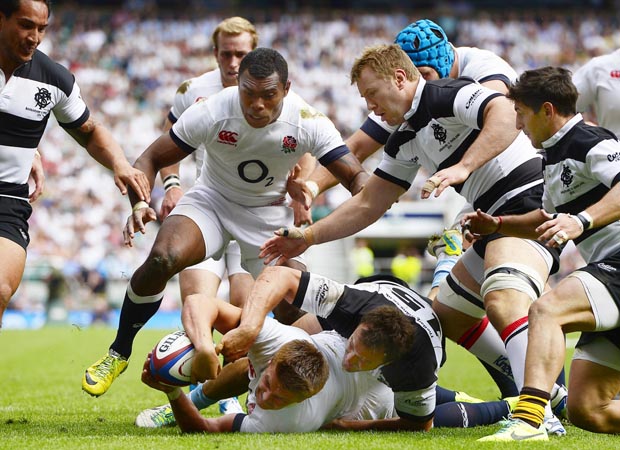 How could Henry Slade give up on the dream of winning the 2015 World Cup final for England when the last one was won by Stephen Donald? It has not by-passed the 21-year-old Exeter Chief's fly-half that New Zealand's winning penalty in the 2011 final at Eden Park was kicked by the hitherto discarded and out-of-shape Donald, who was hauled out of the pub and squeezed into a slimline black No.10 shirt before being pressed into action as his country's fourth-choice tactical general after a brutal run of injuries ruled out Dan Carter and his understudies.
How could Henry Slade give up on the dream of winning the 2015 World Cup final for England when the last one was won by Stephen Donald? It has not by-passed the 21-year-old Exeter Chief's fly-half that New Zealand's winning penalty in the 2011 final at Eden Park was kicked by the hitherto discarded and out-of-shape Donald, who was hauled out of the pub and squeezed into a slimline black No.10 shirt before being pressed into action as his country's fourth-choice tactical general after a brutal run of injuries ruled out Dan Carter and his understudies.
Donald's resurrection has since become the inspiration for The Kick, a film about his World Cup journey from villain to hero, tracing his vilification after New Zealand lost to Australia in Hong Kong in 2010 to his totally unexpected moment of triumph. It also explains why 2013 England Junior World Champion Slade – who is fresh off the production line rather than in the clutches of the scrapyard claw like Donald was – has no intention of throwing in the towel irrespective of a queue ahead of him which includes Owen Farrell, George Ford, Freddie Burns, Danny Cipriani and Stephen Myler.
He says, “Do I think I've got a chance? Yes. Stephen Donald (pictured) was miles off the pecking order at the start of the tournament, and yet he got there to make that kick. I'm on the outer edge of the England squad at the moment, but I played for an England XV against the Barbarians (in June) and I've been to a couple of England camps – including the most recent one.”
Slade merits recognition after an impressive Premiership and European breakthrough for Exeter last season which built on the impact he made for the England U20s in their inaugural IRB Junior World Championship triumph. He kicked 13 points when they secured the title for the first time by beating Wales 23-15 in the final in Vannes (France). In 13 matches for the England U20s, who also won a Grand Slam that season, the young Chief scored 133 points (a try, 28 conversions, 23 penalties and a dropped goal).
Last campaign Slade started seven of Exeter's last 10 games, and overall made 18 Premiership appearances after spending the previous two seasons learning his craft as a dual-registered player with his hometown club, Plymouth Albion.
The all-round strength of his game and composure saw him win game-time despite fierce competition for the Chiefs fly-half berth from Gareth Steenson, Ignacio Mieres (now with Worcester) and Ceri Sweeney. It forced him into Saxons contention and he made his debut for the England second string side off the bench against Ireland Wolfhounds at Gloucester in January this year, before making even more of a mark six months later with his stalwart defence in England's non-cap 39-22 loss to the Barbarians.
The first-half of that Twickenham encounter saw Slade run into Rene Ranger, the heavily-built Montpellier-based All Black wing – although it was more a case of a full-tilt Ranger steaming into him. Slade did not flinch, bringing down the rugged Kiwi despite sustaining a nine-stitch cut to the eye and a bruised cheekbone, and he stood his ground again when the Barbarians powerhouse charged down the wing moments later.
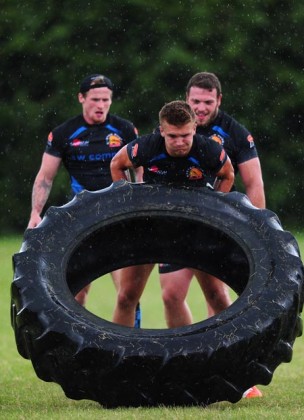
Slade's defensive philosophy is uncomplicated – “You have to win the collisions and be aggressive”. As an ardent schoolboy disciple of Jonny Wilkinson, he wouldn't have forgiven himself if he hadn't stood up to be counted — especially after comparing notes with his boyhood hero when Exeter played Toulon in the last edition of the Heineken Cup.
The Chiefs gave a good account of themselves, and, despite being edged out at home and beaten at the Stade Mayol by the reigning European champions, Slade was cock-a-hoop after his encounter with Wilkinson.
One of Slade's early rugby landmarks learning the game at Ivybridge RFC was watching the 2003 World Cup final in the clubhouse, aged 10, and jumping for joy and cracking his head on the table he'd been sitting under as Wilkinson kicked the winning drop-goal that is now part of English rugby folklore.
“Being a 10, Jonny Wilkinson was my main inspiration, and, although I got a bit of stick for idolising him, his commitment and work ethic were exceptional. I started against Toulon over there, and it is one of my favourite matches. Afterwards in the changing rooms I took a ‘selfie'of Jonny and myself together and we talked about the game. He said he was impressed by the way we played and what we brought in attack, although what I remember was that you could hardly hear yourself think when they did the ‘Pilou, Pilou'chant before the match. There was a great atmosphere throughout, and at the final whistle the crowd tore up newspapers and threw them in the air.”
Slade cherishes the memory. However, with each passing season the star-struck element is bound to fade as the Devon born-and-bred youngster finds his feet in the elite tier.
This season is about Slade taking the next step in his rugby education according to Chiefs coach Rob Baxter – and that means giving him as much match practice as possible.
Baxter takes the view that with Steenson's experience putting him in pole position at fly-half, Slade is best employed at centre rather than kicking his heels on the bench. It is an established principle that you get your best players on the pitch, and judging by Slade's presence at 13 in the Chiefs starting line-up for today's awkward opening Premiership clash against newly-promoted London Welsh at the Kassam, Baxter believes his virtues include adaptability.
“He is a hard worker, and it is great to be versatile because it means you can be a starter in more than one position. The attribute Henry has that I like most is his competitive nature. He is a very competitive guy, and that stands out in his defence and in his training ethic.”
Baxter adds: “What is beneficial is game-time and learning by degrees – taking small positive steps – and playing 12 or 13 is better for Henry than sitting on the bench. We are all aware that Jonny Wilkinson and Toby Flood both played a lot of their early Premiership rugby at centre before they moved to 10. He's still only 21, but wherever we've asked him to play he's been exceptional.”
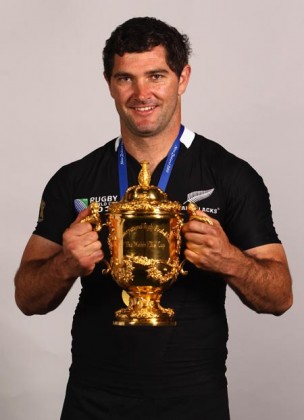
With wing Jack Nowell becoming the first of the Chiefs contingent of England U20 starlets to win full Test caps last season, Baxter is optimistic that Slade can emulate him.
“The way England want to play fits with Henry's attributes. He is pacey and quite elusive, and he's got a relatively big frame which helps in midfield. You can only see him getting better with experience. There's nothing wrong with impatience in a player if it's used positively – but I get the impression he is prepared to take his time.”
He cautions: “The thing for him, as with all young guys, is not to think you've made it when you are picked as a starter, but to recognise that's where it begins – and to use it to take the next step forward.”
Slade says of the adjustments from England U20 to senior rugby: “At age group level you are not exposed to the consistently high pressure rugby you get in the Premiership. It's about learning how to handle pressure in terms of your strategy and execution.”
He continues, “Physically we've had a whole season and done all right – but Sam Hill and Luke Cowan-Dickie are big lads anyway. I've had to work at it a bit more, and obviously playing in the centre you are up against all shapes and sizes. Over the summer we had a big focus on strength and power at the Chiefs, and have made big increases – for myself I've gone up to 92kg (14st 4lb) from 87kg (13st 7lb).”
Slade is no stranger to growth spurts, having shot up to 6ft 2ins after being little more than 5ft 6ins when he was 15, and he is also unfazed by the positional switch he faces.
“The move from fly-half to centre is not massively difficult. Centre is different, but I often play as a second 10 with Gareth Steenson, and it gives us left-footed (me) and right-footed kicking options. You also get a bit more thinking and scanning time at centre than you do at fly-half.”
The rugged London Welsh centre-pairing of Tom May and Tim Molenaar will be hell-bent on altering that perception but, on the subject of scanning ahead, Slade has no truck with the suggestion that Exeter are a relegation zone outfit this season. “I wouldn't agree with that – we've made some decent signings and the boys (Moray Low, Thomas Waldrom, Ryan Caldwell, Chrysander Botha) have settled-in well. We've had three tough pre-season matches two of them on the road against Cardiff Blues and Ulster, and then home against Worcester, and won all three.”
He is also of the view that you are never too young as a midfield back to air your views: “At fly-half you definitely have to be one of the leaders and we all take charge in organising the attack – it's the 10 who calls the strike moves. But I'll definitely call out if I see something. You can't be quiet out there or you'd never see the ball.”
Slade knows, however, that it is deeds rather than words that make the biggest noise.
*This article was first published in The Rugby Paper on September 7.


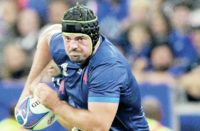
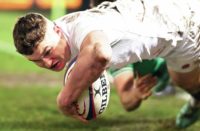
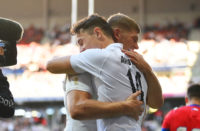























Pingback: Best universities in Africa